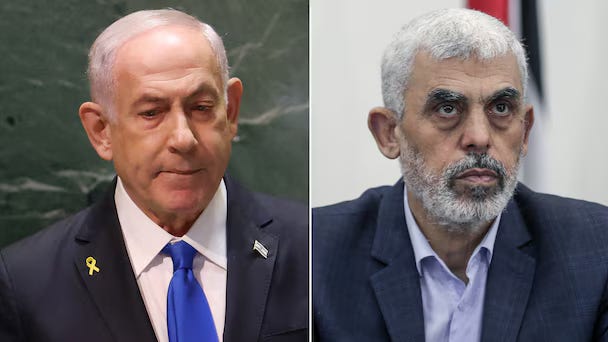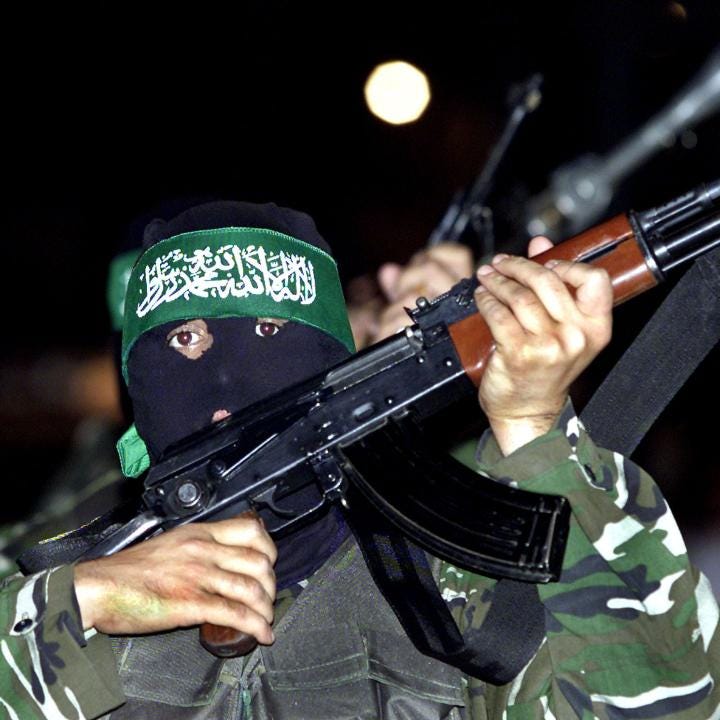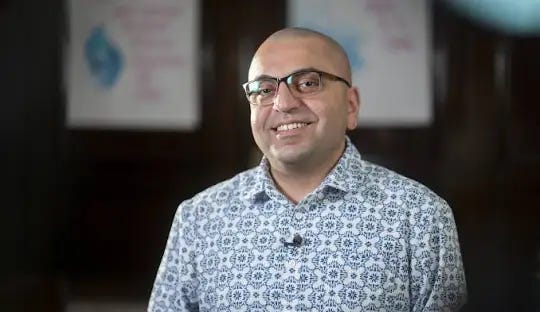When doing the right thing goes tragically awry
Sinwar's survival led to much death. Will his death do the opposite?
Dr. Yuval Bitton, an Israeli dentist, was working in the Nafcha Prison in 2004 when an inmate complained to him about neck pain and balance issues. Bitton thought the prisoner was suffering from a stroke, so he and a colleague took him to an Israeli hospital, where the man was diagnosed with a brain abscess and quickly operated on.
The prisoner, Yahya Sinwar, was serving four life sentences for murder after killing at least four Palestinians he believed were collaborators. But, after 22 years in prison, he and more than 1,000 others were released in 2011 in a deal for Hamas to free an Israeli soldier, Gilad Shalit, after five years as a captive. Sinwar promised to repay Bitton for saving his life.
Sinwar, a psychopath who killed some of his victims with his own hands and was known among Palestinians as the Butcher of Khan Younis, found a perverse way to thank Bitton and Israel. He masterminded the terrorist attacks that killed some 1,200 in southern Israel on Oct. 7, 2023, including Bitton’s 38-year-old nephew, Tamir Adar, and the capture of more than 240 hostages.
Of course, Sinwar now is dead, killed by Israeli soldiers in a gun battle in Rafah in southern Gaza. Does this mark the beginning of the end in at least one of Israel’s battlegrounds?
“To the Hamas terrorists I say: your leaders are fleeing, and they will be eliminated,” Israeli Prime Minister Benjamin Netanyahu said in a televised address. Speaking to Palestinians in Gaza, he added: “Hamas will no longer rule Gaza. This is the beginning of the day after Hamas, and this is an opportunity for you, the residents of Gaza, to finally break free from its tyranny.”
But will Gazans take heed? Will they now turn on the rudderless remnant of Hamas hiding among them? Will Palestinian mothers beg their sons to desert? After tens of thousands have been killed, will the nearly 2 million remaining Gazans find ways to seek peace?
As Israeli soldiers comb through the wreckage that is Gaza, will residents disgusted by Hamas tyranny guide them to the many miles of tunnels where, perhaps, thousands of remaining Hamas terrorists hide? Will Gazans guide Israelis to the places where, perhaps, some hostages from the Oct. 7th attacks still survive? Some 97 remain unaccounted for.
Some Gazans have at least turned gunmen away from schools and other shelter areas, according to The New York Times. “We will quickly kick anyone who has a gun or a rifle out of this school,” said Saleh al-Kafarneh, 62, who lives at another government school in Deir al Balah and said he locked the gates at night. “We don’t allow anyone to ruin life here, or cause any strike against those civilians and families.”
As the newspaper reported, Israel has increased the rate of its airstrikes on schools turned shelters to target what it calls Hamas command-and-control centers. It says militants have “cynically exploited” these sensitive sites, including UN areas, as locations for planning operations.
Embedding its fighters in such areas – and thus spawning killings of civilians in scenes broadcast around the world -- fits Sinwar’s sadomasochistic and sociopathic vision. As The Wall Street Journal reported, the terrorist leader infamously pointed to civilian losses as “necessary sacrifices,” mentioning national-liberation conflicts in places such as Algeria, where hundreds of thousands of people died fighting for independence from France.
In an April 11 letter to the now-dead Hamas political leader Ismail Haniyeh after three of Haniyeh’s adult sons were killed by an Israeli airstrike, Sinwar wrote that their deaths and those of other Palestinians would “infuse life into the veins of this nation, prompting it to rise to its glory and honor.”
One has only to watch cable news coverage – and read much of global print coverage – to see how Sinwar’s views of turning his people into martyrs has turned Israel into a pariah in many quarters. No doubt, the carnage that has taken so many Gazan lives has cost Israel much of the world’s sympathy, with at least 14 condemnatory votes in the UN last year alone. And demonstrators on lots of college campuses, like useful idiots, have fallen in line behind Sinwar’s lead.
In addition to isolating Israel in much of the world, Sinwar triggered a seven-front war with his invasion of the country. Months ago, Netanyahu listed the battlegrounds as Iran, Hamas in Gaza, Hezbollah in Lebanon, the Houthis in Yemen, Shia militants in Iraq, militant groups in Syria as well as Palestinian fighters in the West Bank.
This monstrous figure’s legacy is astonishing. But the bloodshed surely will not end with his death alone. Indeed, Netanyahu made this clear in his address:
“The mass murderer who murdered thousands of Israelis and kidnapped hundreds of our citizens was eliminated today by our heroic soldiers,” he said. “And today, as we promised to do, we came to account with him. Today, evil has suffered a heavy blow, but the task before us is not yet complete.” Netanyahu added that the war “is not over yet.”
Certainly, beheading the snake marks a major turn. It could hasten an end to some of the worst fighting — or so some optimists are arguing.
“This moment gives us an opportunity to finally end the war in Gaza, and it must end such that Israel is secure, the hostages are released, the suffering in Gaza ends, and the Palestinian people can realize their right to dignity, security, freedom, and self-determination,” Vice President Kamala Harris said. “And it is time for the day after to begin without Hamas in power.”
Just how long this “opportunity” will take to realize, however, is fraught. Much turns now on how Israel and its neighbors react.
“Sinwar’s elimination could provide the Israeli government with several off-ramps and openings to start to end the war in Gaza,” argues Ahmed Fouad Alkhatib, a resident senior fellow with the Scowcroft Middle East Security Initiative at the Atlantic Council’s Middle East Programs. “The chaos within Hamas following Sinwar’s death may provide a chance to exploit uncertainties and divisions to expedite the release of the remaining Israeli hostages and the implementation of a general stand-down and demobilization within Hamas.”
Alkhatib, who grew up in Gaza City and advocates coexistence, offers a few suggestions:
“Israel, Arab nations, and the United States should now offer mass amnesty for remaining Hamas members who lay down their arms and stop fighting. They should also offer financial rewards to those who either turn in Israeli hostages or provide information leading to the whereabouts of remaining abductees,” he contends. “Israel should make clear its intention to pull out of Gaza and avoid the reoccupation of the Strip in the immediate future. And Gaza should be opened up for Arab, international, and Palestinian Authority figures and professionals to come in and begin stabilizing the war-torn Strip to initiate the ‘day after.’”
But he also raises troubling questions, such as: Who can Israel and Arab nations negotiate with when it comes to Gaza and Hamas’s future role (should there be one)? Who within Hamas in Gaza will control the issue of Israeli hostages, and who could command enough authority to make the group’s rank-and-file members release the hostages? Will Hamas splinter into small, disconnected cells inside Gaza, or can an interim leader emerge to keep the organization together?
For now, Sinwar’s death prompted some scattered celebrations in Israel. “Beachgoers in Tel Aviv erupted in cheers,” The Washington Post reported. “Families of soldiers killed in Gaza posted videos of themselves dancing with pictures of their lost relatives. Flag-waving celebrants filled a traffic circle in Carmel.”
But no real celebration can emerge until surviving hostages come home and the fighting ends. Most Israelis crave nothing more than peace and the lengths they go to to save lives are extraordinary at times — both of their countrymen (see Shalit) and of others.
Bitton, the dentist most responsible for saving Sinwar, has said he doesn’t regret saving the former prisoner, even if his death years ago may have spared Israel of so much agony since. Part of that has to do with the obligations every doctor has to save lives, he said.
“Second, these are our values both as Jews and Israelis. We aren’t taught to hate our enemies,” Bitton said. “We don’t desire vengeance. We know the righteousness of our path, why we are here and what we need to do in order to survive.”
He harked back to a visit to Israel by Egyptian President Anwar Sadat in 1979.
“I was a 13-year-old boy,” Bitton said. “I stood by the side of the road waving the Israeli and Egyptian flags together with my entire school. We cheered the person who up until then had been our greatest enemy. This was the man who had said that he was ready to sacrifice a million Egyptian soldiers to destroy Israel. But when he spoke to us in the language of peace, we responded in kind.”
Over several years, Bitton spent hundreds of hours talking with Sinwar. The terrorist used his time in prison to study Israel in depth, often taking courses in areas such as history through an open-studies program. The conversations gave Bitton exceptional insights into the thinking in terrorist groups.
In 2007, Bitton joined the prison service’s intelligence branch.
“I became the intelligence officer of Ketziot Prison, where 3,000 terrorists were being held. The entirety of the Hamas leadership in Yehudah and Shomron was in Ketziot at the time,” Bitton said. “After that, I had a number of other positions including as head of the terror department. I was responsible for the intelligence that was collected from the 12,000 security prisoners in the system. “
In 2015, he was promoted to head the entire intelligence division, a position he held for four and a half years. He left the service in 2022.
“So, although we don’t hate our enemies, we also know who they are and what they are capable of,” Bitton said.
Sinwar, of course, was capable of astonishing savagery as well as indifference to the sufferings of his own people. He was part of a culture of martydom that has long hobbled Palestinian efforts toward coexistence.
Tragically, Sinwar’s life made an enormous and awful difference. Surely, his death will have a substantial impact. But until and unless his culture’s glorification of death is shattered, his horrific legacy will live on.






